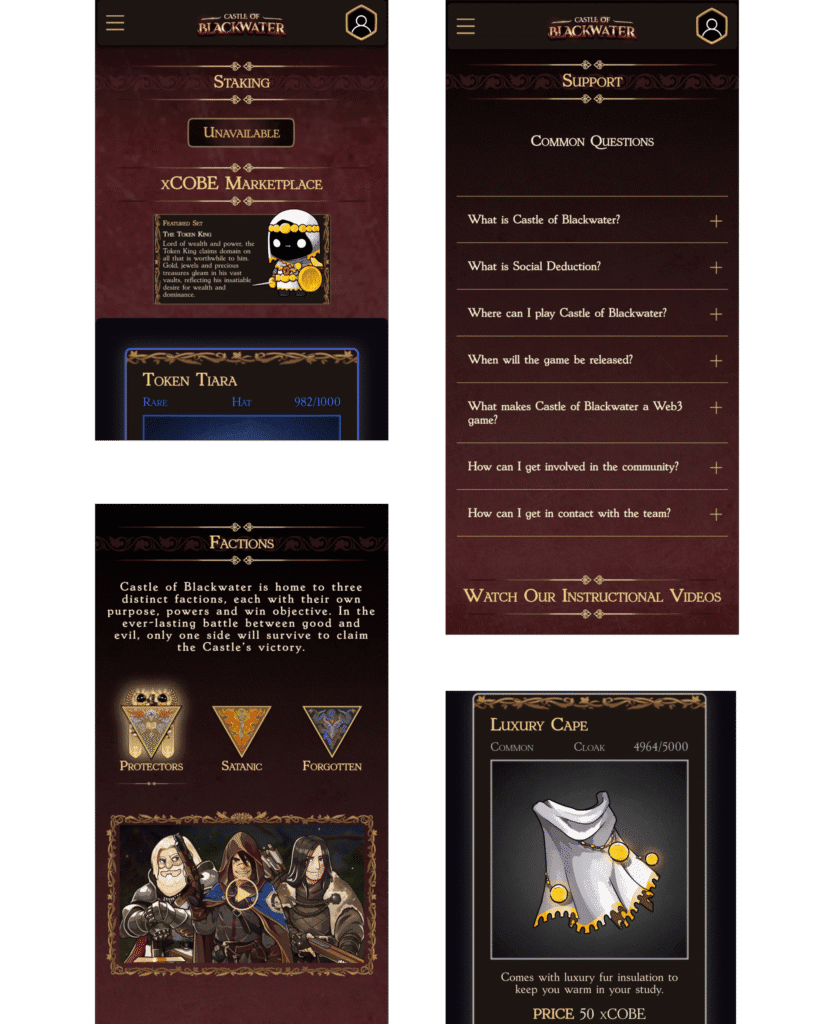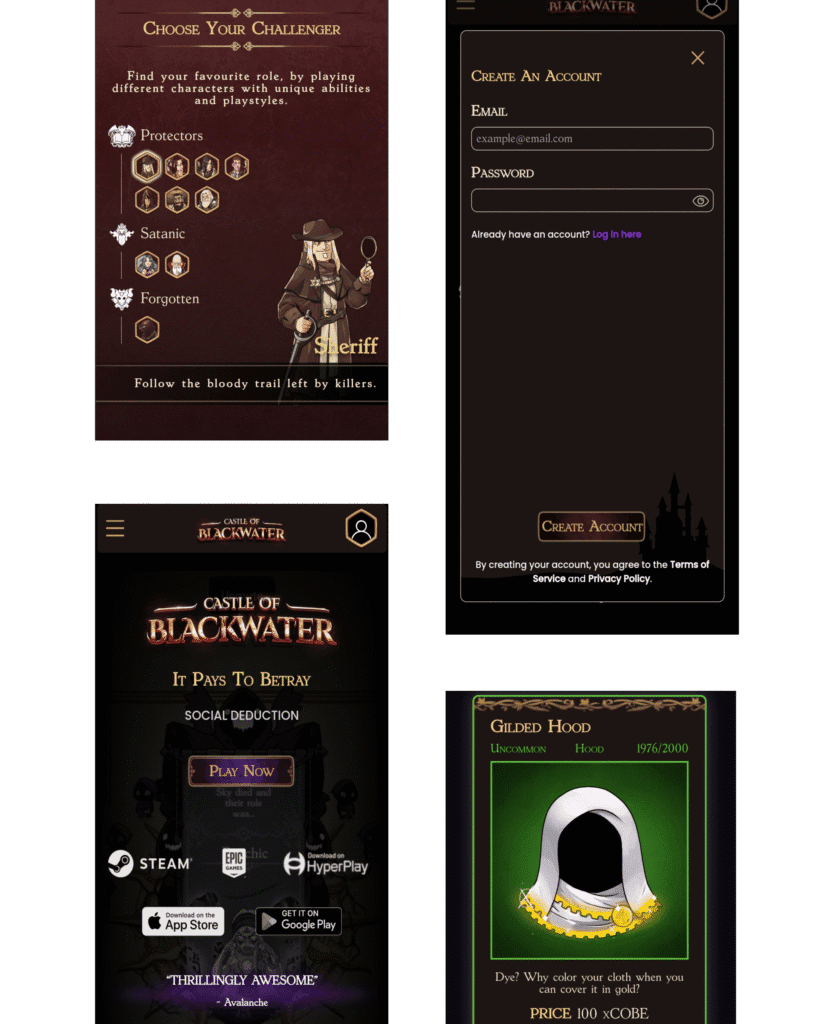
Decentralized gaming platform
Castle of Blackwater, accessible at castleofblackwater.com, is an innovative decentralized gaming platform that integrates Blockchain Technology to offer a unique, immersive, and secure gaming experience. This platform is designed to provide gamers with true ownership of in-game assets, transparent and fair gameplay, and opportunities to earn rewards.

Get Started with this product
Castle of Blackwater empowers players with true ownership of in-game assets via blockchain technology. Every item, character, and resource is represented as a non-fungible token (NFT), enabling secure trading, selling, or transferring of assets. This decentralized ownership model fosters transparency and trust, as all transactions are recorded on the blockchain with verifiable proof of ownership.
The platform features a play-to-earn model that rewards players with cryptocurrency for participating in gameplay and completing challenges. Players can earn tokens by reaching milestones, winning battles, or engaging with the community. These tokens can be traded or staked for additional rewards, transforming gaming time into real value.
Castle of Blackwater delivers a rich and immersive gaming experience through various game modes like quests, battles, and tournaments. The gameplay is built to be strategic, skill-driven, and fun, while an AI-powered matchmaking system ensures fair, competitive, and balanced play—keeping players hooked and constantly improving.
Castle of Blackwater supports interoperability with multiple blockchain networks, allowing players to trade NFTs seamlessly across platforms and tap into external DeFi protocols. This cross-chain integration not only enhances asset utility but also broadens gameplay possibilities, creating a more connected and flexible gaming ecosystem.
Security is a cornerstone of Castle of Blackwater. The platform uses cutting-edge cryptographic techniques and multi-layered protections to keep user data and assets secure. With regular security audits and real-time updates, the system remains resilient against evolving threats, ensuring a safe and trusted gaming environment.
Castle of Blackwater empowers its community through decentralized governance. Players can propose updates, vote on changes, and help shape the platform’s evolution. This participatory model fosters transparency, collective decision-making, and a deep sense of ownership, strengthening player engagement and loyalty.
The client envisioned a groundbreaking decentralized gaming platform that would redefine the traditional gaming experience by leveraging the power of blockchain technology. Their goal was to create an immersive digital ecosystem where players could truly own, trade, and manage their in-game assets with full transparency and security. Central to this vision was the principle of player empowerment—giving users actual ownership through NFTs (Non-Fungible Tokens) and enabling them to participate in a thriving in-game economy without centralized control or restrictions.
To bring this vision to life, several core requirements had to be addressed. First and foremost was the need for a highly scalable and secure infrastructure. The platform had to be capable of handling thousands of concurrent players and high volumes of transactions in real time. Any delays, system lags, or breaches could compromise the user experience and erode trust. Nadcab Labs took on the challenge of developing a robust backend architecture that ensured seamless performance even during peak loads. Advanced consensus algorithms and optimized smart contract designs were implemented to guarantee speed, efficiency, and stability.

Castle of Blackwater adopts Proof of Stake (PoS) as its core consensus mechanism, selecting validators based on the amount of tokens they are willing to stake. This method significantly reduces energy consumption compared to Proof of Work (PoW).
To further boost efficiency, the platform implements Delegated Proof of Stake (DPoS). Token holders vote for a limited set of delegates who are responsible for validating transactions. This model streamlines consensus by relying on a trusted subset of validators, enabling faster transaction processing.
Castle of Blackwater combines PoS and DPoS to create a hybrid consensus model that balances decentralization, security, and performance. This approach leverages the decentralized security of PoS and the operational speed of DPoS, resulting in a scalable and reliable network infrastructure.
The platform’s DPoS layer features a stakeholder voting system. Token holders participate in governance by voting for delegates, ensuring that only trusted individuals are selected to validate blocks.
Validators are chosen based on both their stake and the number of votes received from the community. This dual-criteria system ensures that validators are not only financially committed but also supported by stakeholders, fostering a trustworthy and performance-oriented validation process.
Castle of Blackwater incentivizes validator participation through a structured Staking Rewards system. Validators earn rewards based on the size of their stake and their performance within the network. This rewards model encourages continuous engagement and contributes to the long-term stability.
Visual identity and design elements
Primary font family and usage

Brand colors
#eccf87
#3f1777
#000000
The project followed a structured approach to ensure the successful implementation of Castle of Blackwater. The initial phase involved a comprehensive analysis of client requirements and market research to understand the competitive landscape. This was followed by the design and architecture phase, where a scalable and secure architecture was developed to support the desired features. The development phase employed an iterative process with regular feedback loops to incorporate client and user feedback, ensuring that the platform met all requirements and expectations.
Castle of Blackwater achieved significant milestones post-deployment. The platform witnessed rapid adoption within the gaming and blockchain communities, reflecting its robustness and appeal. Performance metrics indicated high throughput and low latency in transaction processing, meeting the scalability requirements effectively. The security measures proved effective, with no major security breaches reported, underscoring the reliability of the implemented protocols. User feedback was overwhelmingly positive, with high satisfaction regarding the intuitive interface and seamless functionality.
With its strong foundation and innovative features, Castle of Blackwater is well-positioned for future growth and expansion. The platform continues to evolve, incorporating new technologies and features to enhance its capabilities further. Ongoing research and development efforts focus on improving scalability, security, and user experience, ensuring that Castle of Blackwater remains at the forefront of decentralized gaming.

One of the primary challenges faced during the development of Castle of Blackwater was ensuring scalability. The platform needed to handle a large number of transactions per second without compromising on performance. This required innovative solutions and optimizations to achieve the desired throughput and efficiency. By leveraging advanced blockchain technologies and architectural optimizations, the team was able to address these scalability challenges effectively.
Ensuring the security of Castle of Blackwater was a significant challenge. Protecting against potential vulnerabilities and ensuring the integrity of data and transactions required implementing advanced cryptographic techniques and robust security measures. Regular security audits and testing were conducted to identify and mitigate potential threats, ensuring a secure and reliable platform for users.
Integrating Castle of Blackwater with other blockchain networks and traditional systems presented several complexities. Ensuring seamless interoperability and smooth data flow required addressing compatibility issues and developing robust APIs. The team employed a modular approach to integration, allowing the platform to interact with various systems and networks efficiently.

Castle of Blackwater utilized a diverse set of technologies to meet its objectives.





